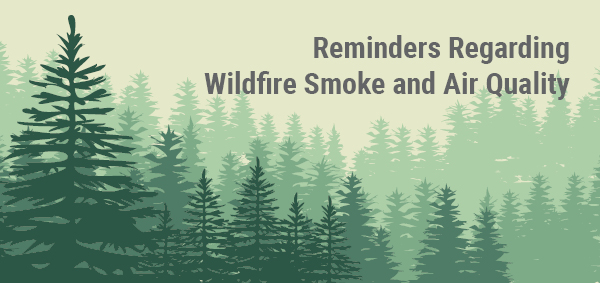
Every year in British Columbia there are hundreds, and sometimes thousands, of wildfires (also called forest fires). The smoke from these fires effects air quality and often contains fine particles that can penetrate deep into the lungs (Environment and Climate Change Canada, 2017). Poor air quality can be especially harmful for older adults, pregnant women, children and those with heart and lung disease. During heavy smoke conditions, everyone is at risk.
"Because smoke can be carried by high level winds, locations hundreds and even thousands of kilometres, communities downwind can be almost as severely affected as those close to the fire zone. Dense smoke from wildfires can cause very high levels of air pollution, with the amount of fine particles in the air greatly exceeding normal levels" (Environment and Climate Change Canada, 2017).
In the peak of wildfire season, it is important to keep a close eye on any Air Quality Advisories issued by the Government of BC (HealthLink BC, 2017).
As a person with Parkinson's, there may be some additional points to consider regarding your health and preparing for a potential evacuation order or alert.
- Keep all your medications in one place, and ensure your loved one(s) know where to find them. This will make them easily accessible if you are required to evacuate.
- Pack your Aware in Care Kit. We recommend packing this for use in the event you are hospitalized. The kit will also ensure that key medical information is accessible, as an evacuation order may present additional challenges in obtaining information/documentation from your physician, healthcare providers, etc. (especially if they are under an evacuation order or alert as well).
- Make back-up transportation plans. If you are the primary driver in your household, you should consider making a back-up plan should your medication "off" times interfere with the timing of an evacuation order.
Tips on how to protect your health from wildfire smoke:
- Limit outdoor activity and strenuous physical activites as much as possible. If you have difficulty breathing, reduce your activities or stop altogether.
- At home: Stay indoors with the windows closed. Turn off your furnace and air conditioner as it may draw smoke indoors. Keep indoor air cleaner by avoiding smoking or burning other materials.
- In a vehicle: Keep the windows closed and set the ventilation system to recirculate.
- Care for others: Watch out for others in your care who may be more vulnerable to smoke.
- Leave the area: If you are able to, make arrangements to move to a location with cleaner air.
- Consult your physician or local health authority for additional advice. Most provinces and territories also offer health advice through a telephone hotline.
Tips for staying cool indoors during an air quality advisory:
- Keep the windows and blinds closed while the sun is up.
- Install an air conditioner (recommended with a health efficiency particulate air filter). Make sure that it recirculates air from inside your home only and that the filters are clean. Please note that during some air quality advisories it may be recommended that you turn your air conditioner off.
- Drink plenty of cool, non-alcoholic beverages.
- Place a bowl of ice in front of a fan to create a cool breeze.
- Avoiding smoking or burning materials inside your home.
- Avoid using the oven and instead cook on the stovetop or BBQ outdoors.
- Do any physical activity in the cooler morning or evening hours.
- Spend time in the cooler rooms of your home, like a basement.
- Wear lightweight, loose-fitting clothing.
- Take a cool shower or bath.
- Avoid getting a sunburn when out in the sun.
If you live in a high-risk community, we encourage you to learn more about wildfire emergency preparedness.
References
Environment and Climate Change Canada. (2017). Wildfire Smoke and Air Quality. Retrieved from the Government of Canada website: https://ec.gc.ca/cas-aqhi/default.asp?lang=En&n=63B57543-1
HealthLink BC. (2017). Wildfires and Air Quality. Retrieved from the HealthLink BC website: https://www.healthlinkbc.ca/health-feature/wildfires-and-air-quality